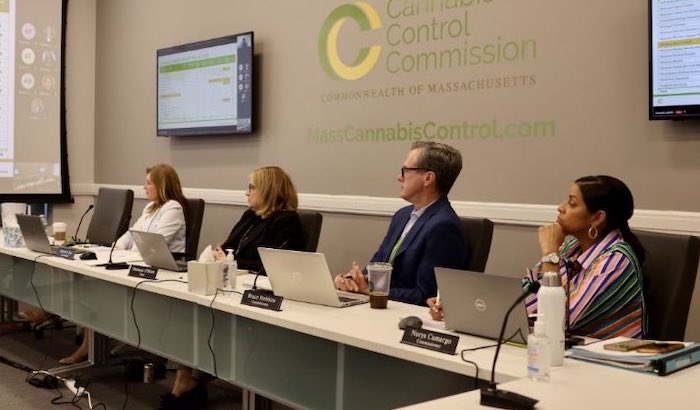
Commissioners were set to discuss the burdensome “two-driver rule,” but couldn’t agree on how to proceed with the conversation. It wasn’t the only disagreement at the meeting.
Even in the midst of a Cannabis Control Commission leadership quagmire and as agency working groups finalize recommendations for regulatory changes on several fronts, commissioners included time for a discussion about the much-hated “two-driver rule” on their crowded agenda for today’s public meeting.
The regulation in question applies to cannabis delivery companies having to put two employees on the road together. Operators with these license types say they are already struggling due to excessive compliance among other factors, and have for years argued that the two-driver stipulation is especially burdensome. But after these businesses were given some hope that the costly rule was finally going to be addressed, commissioners instead kicked it down the road for a future meeting, implying that they’ll have to study the situation closer before making changes.
It’s hardly the first time that CCC members have heard these gripes though. Delivery licensees spoke to commissioners at a June 2022 roundtable discussion, then again at a Mass Cannabis Business Association (CBA) gathering in March of this year, and during a virtual roundtable this May with commissioners Ava Callender Concepcion and Nurys Camargo.
In July, Devin Alexander, a co-founder of Rolling Releaf and the City of Newton’s first Black-owned cannabis business proprietor, pleaded with commissioners during a listening session hosted by the group Equitable Opportunities Now. An outspoken advocate for all delivery companies, he said, “We don’t need a working group, you know what needs to be done. It’s way past time now. There are delivery companies that are in dire need.”
In that public forum, Alexander noted that commissioners have expressed willingness to address the two-driver stipulation, but have yet to take action. And while they were scheduled to at least consider the topic during today’s meeting, the agenda point was skipped due to significant confusion around procedure and process. In a sense, the miscommunication was a proxy for how exchanges on several subjects transpired (more on Thursday’s raucous CCC meeting here).
After stumbling while trying to get the two-driver rule discussion underway, CCC Chair Shannon O’Brien said, “I’d like to remove this [item from the agenda].” Adding that she “thought that in [a previous discussion about] low-hanging fruit that we had consensus that we would like to move through with the two-driver rule discussion.” Instead, she said she’s now more inclined to, “in the next several months,” “do the work as commissioners or with a working group to make sure we are all on the same page as to who may be leading these conversations.”
Commissioner Concepcion clarified that she was simply asking what O’Brien’s intention was behind putting the two-driver rule on the agenda. “To have a conversation,” O’Brien added. To which Concepcion replied, “And now you don’t want to have a conversation?”
After CCC members moved on from the topic, Alexander of Rolling ReLeaf reminded Talking Joints Memo that he and eight other delivery operators also “submitted a petition in September 2022 with more than 400 signatures, and it was never brought up at a public meeting.” He noted that several operators “submitted waivers to see changes to regulations,” as the CCC requested, only for regulators to deny them, saying they didn’t show enough financial hardship—even though some businesses showed accounts in the negative.
The September 2022 letter, penned by Your Green Package Co-Founder & CEO Christopher Fevry, read in part: “The Marijuana Delivery Operator and Courier licenses were created exclusively for Social Equity and Economic Empowerment applicants, but the regulations create undue burdens and operational constraints that render the business model impracticable. This has been an issue the Commission has been informed of since 2020. … Social equity delivery companies are even laying people off, selling vehicles, and are struggling to stay afloat / get off the ground. The Commission has not done anything to address the core problem.”
Asked about the two-driver rule at a press conference following Thursday’s meeting, O’Brien said, “I was trying to find consensus on low-hanging fruit, but the devil is in the details. I’ve never been through a regulatory writing process before.” Adding, “I think there’s consensus that we want to do it. It’s just the details. There are additional nuances and potential problems that we’re going to have to answer.”
“I don’t think it’s low-hanging fruit,” Camargo said. “As policy makers, you can’t just rush through these changes.”
“There is no clarity,” Alexander said. “Earlier this year, Chair O’Brien came up to me and said we were going to fix this. Where do we go from here? The topic of social equity wasn’t even mentioned. There are people bleeding out their life savings.”

























